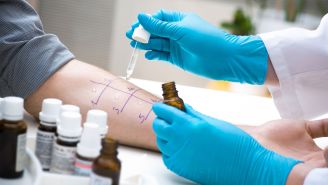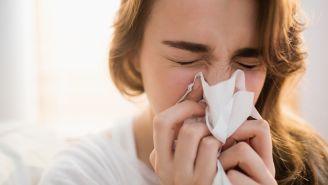Updated on April 3, 2024.
If you’re one of the roughly 81 million people in the United States who experience seasonal allergies, you know the drill: April showers bring May flowers—which brings sneezing, sniffling, and stuffiness.
You might rely on non-prescription allergy remedies to get relief from spring allergy symptoms. But what do you do when over-the-counter medications no longer work?
Evan Atkinson, MD, an allergist and immunologist with Tulane University School of Medicine in New Orleans, Louisiana, helps answer your spring allergy questions.
What causes spring allergies?
Dr. Atkinson: Spring allergies tend to stem from tree pollen. There's nothing about the wood or leaves that you're allergic to. It's pollen that trees release in the spring when they are trying to make baby trees that causes allergies.
How long does spring allergy season last?
Dr. Atkinson: It's going to be different in every part of the country because there are different trees in various parts of the county. For example, in the southeast United States, spring pollen season typically starts in the middle or end of February and generally lasts for two and a half months, taking us through most of April. (Elsewhere in the country, the season may last longer and some research suggests that allergy seasons are generally getting longer everywhere.)
What are the symptoms of spring allergies?
Dr. Atkinson: Spring allergies tend to start with eye symptoms. Pollen has a really good knack for getting in the eyes and causing dry, itchy, and watery eyes. Shortly after that, you’ll often develop nasal symptoms. You’ll get sneezing, congestion, and post-nasal drip. It's like having a cold that never really goes away for a few months. If you're really unlucky and have asthma, too, these pollen allergies can also trigger asthma.
How do I know if I have allergies?
Dr. Atkinson: Allergy testing helps us figure out what's driving a person’s symptoms. When a patient comes in for allergy testing, we'll test for an average of about 35 to 40 types of pollen, trees, grasses, and weeds to get a good picture of the things you are sensitive to in the environment. The test, called a skin prick, is a simple procedure that doesn’t hurt or involve needles.
During the test, a purified extract from different allergens is placed just under the top layer of your skin. If you’re sensitive to the substance, you’ll form a little hive.
What treatments are available?
Dr. Atkinson: We have really good, safe allergy treatments—most of which are available over-the-counter. There are antihistamine tablets, which work really well for itchy eyes and your nose, as well as sneezing symptoms. We also have nasal spray.
The main class of nasal spray that we use is called a corticosteroid, which is really good at turning down inflammation in the body. Of all the medications that we have for allergies, that one is the most effective. That's currently the one that we would start with. If that's not enough to take away all of our patient's symptoms, we would probably add things like the antihistamine tablet.
What can I do if medicines don’t relieve my spring allergy symptoms?
Dr. Atkinson: Allergen immunotherapy, aka allergy shots, can help. It's the only cure that we have for allergic disease. We can literally take the things you're allergic to and we can turn that part of your immune system off.
Remember purified pollen that’s used for the skin testing? We use the same exact things and we mix them together in a vial that we make specifically for the patient based on their test results. Then we give the patient regular injections of the extract into their arm, right under the skin.
Immunotherapy typically has to be given for about three to five years to have lasting benefit. And because of its risks, it should always be done in a clinician's office by a doctor who is comfortable with doing it. It should never be done at home.
Can spring allergy symptoms be prevented?
Dr. Atkinson: If symptoms are bad enough and the patient is interested, I recommend doing immunotherapy. If that’s not a desirable option, we want to really focus on medication.
Anticipate allergy season and start full force with your medications a few weeks before the allergy season really gets here. For example, if the oak tree pollen starts to come down right at the end of February, then start in mid-February. Even though you're feeling well, you want to go ahead and take your nasal sprays on a regular basis. Staying ahead of the game is going to make the allergy season a lot more tolerable for you.







